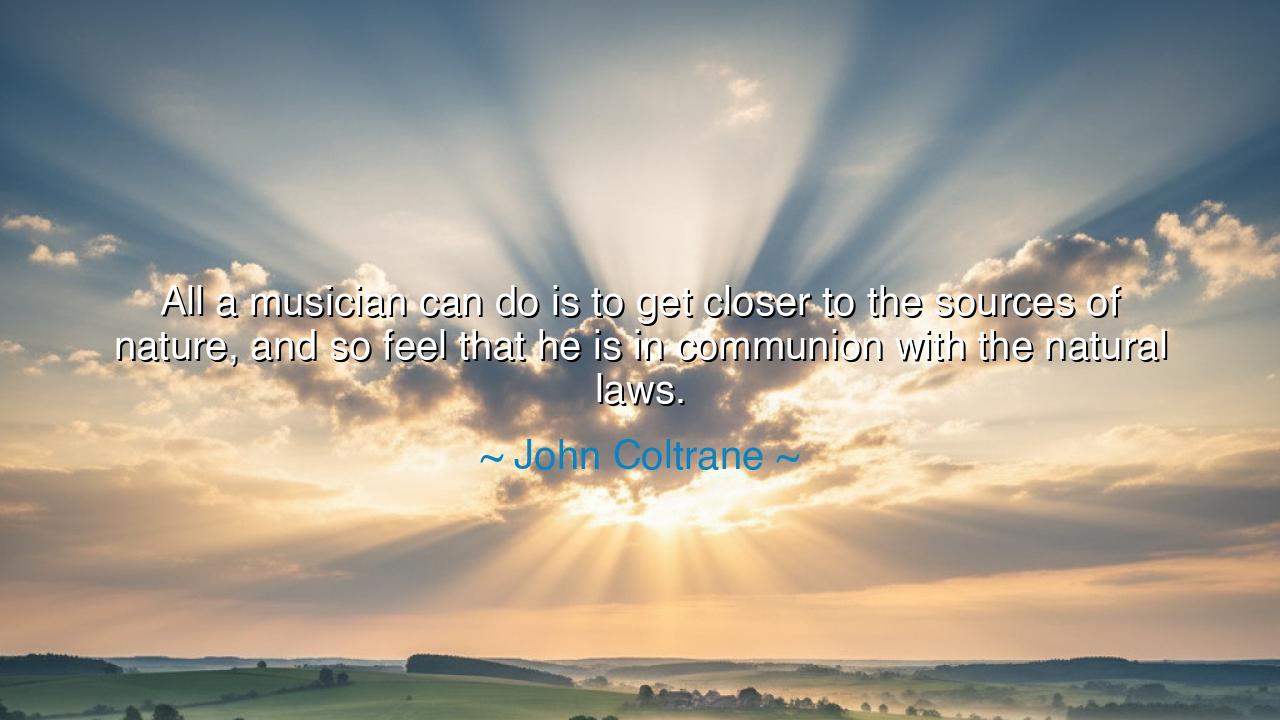
All a musician can do is to get closer to the sources of nature
All a musician can do is to get closer to the sources of nature, and so feel that he is in communion with the natural laws.






The words of John Coltrane, master of the saxophone and seeker of truth, carry the tone of prophecy: “All a musician can do is to get closer to the sources of nature, and so feel that he is in communion with the natural laws.” Here he reveals that music is not merely sound, but a bridge to the eternal. The true musician is not one who dazzles with technique alone, but one who bends his ear to the sources of nature, who listens to the rhythms of wind, the harmonies of rivers, and the silent pulse of the stars. To play music, in this vision, is to touch the divine structure of existence itself.
The meaning of this teaching is profound. Coltrane reminds us that the role of the musician is not to dominate sound, but to discover alignment with natural laws. Music, then, is not invention, but revelation. The patterns of melody, rhythm, and harmony are already inscribed in the universe—in the beating of the heart, in the rising and falling of the tide, in the shifting of the seasons. The musician’s task is to draw near, to listen, and to reveal this hidden order to the ears of humankind.
This truth is echoed in the lives of the ancients. The philosopher Pythagoras taught that the heavens themselves sang in what he called the “music of the spheres,” a harmony created by the movement of the planets. He believed that music on earth was a reflection of this cosmic order, and that to study music was to enter into communion with the very laws of creation. In Coltrane’s words, we hear the same echo—that the musician, by listening deeply, can glimpse eternity and give voice to it in notes and phrases.
Coltrane himself embodied this vision in his great work A Love Supreme. Composed as a prayer, it was not just music but a spiritual offering, a journey through sound that sought to unite the human soul with the infinite. Those who hear it feel not only artistry but communion, as if the saxophone itself were channeling the breath of nature and the whisper of the divine. Here was a man who understood that music at its highest level is service, a way of bringing listeners into harmony with the eternal order.
Consider also the story of Beethoven, who, though deaf in his later years, continued to compose symphonies of thunderous majesty. Unable to hear with his ears, he seemed to draw directly from the natural laws within him, tapping into a source beyond sound. His Ninth Symphony, with its “Ode to Joy,” was not the work of a man inventing, but of one communing with truths already inscribed in creation. His deafness did not hinder him, for the laws of nature were louder than silence, and his soul had learned to listen.
The lesson for us, children of tomorrow, is this: whether musician or not, each of us is called to live in communion with natural laws. Just as the musician listens for hidden harmonies, so must we listen for the rhythms of life—respecting the cycles of work and rest, honoring the balance of giving and receiving, walking in step with the order of the world around us. To live against nature is to create dissonance; to live in harmony with it is to create music with our very lives.
Practically, this means slowing down enough to listen. Hear the song of the wind before you rush. Observe the rising of the sun and the stillness of night. Notice the rhythm of your own breath, and let it remind you that you are part of a larger composition. And if you are a creator—whether of music, of art, or of deeds—let your work flow not from ego but from alignment with these eternal patterns. In doing so, your life itself will become a song of harmony.
Thus remember: the musician’s task is not so different from the task of every human soul. To draw near to the sources of nature, to align with the natural laws, and to give them voice through our actions—that is the path of greatness. For in that alignment lies peace, beauty, and communion with the eternal symphony that was playing long before we were born, and shall continue long after we are gone.






AAdministratorAdministrator
Welcome, honored guests. Please leave a comment, we will respond soon